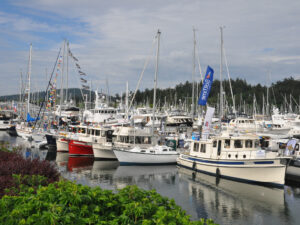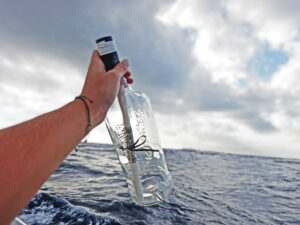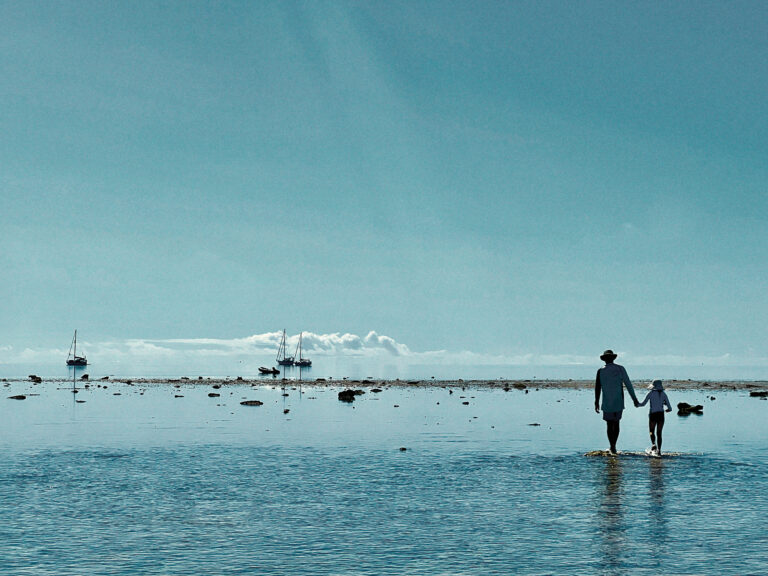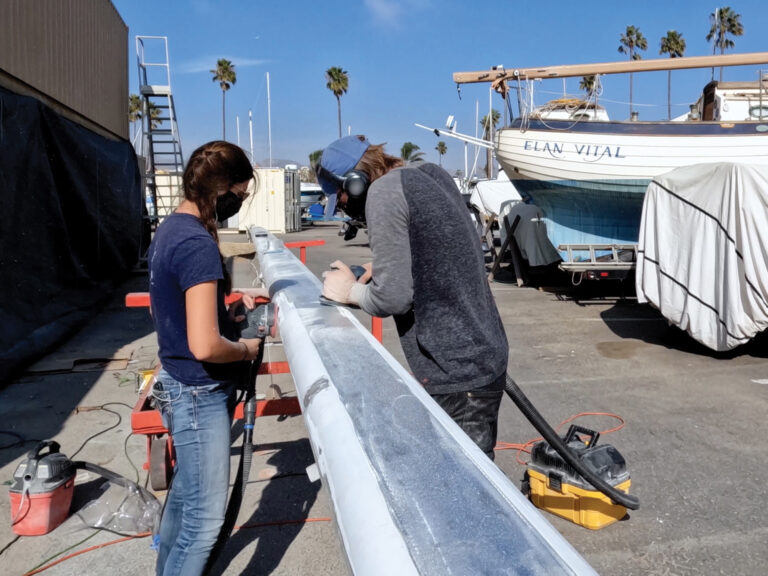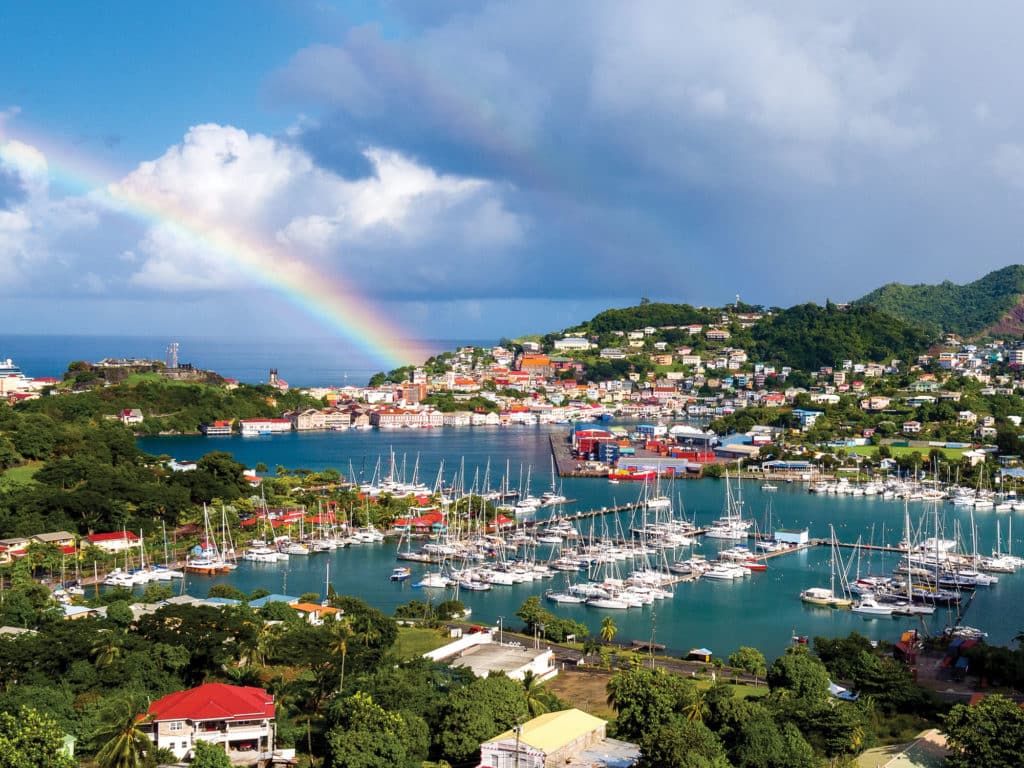
As I made my way toward the stage, stepping carefully through the children seated cross-legged on the floor, a familiar tune rang out in the tropical night. A tall guitarist and his sister led the crowd in a cruiser’s version of perennial favorite “The Lion Sleeps Tonight.”
Daily plotting the fleet positions, we read the new forecast.
Carefully checking all the veg to see what did not last.
Joining in were faces now familiar to me: a British woman with a ukulele, a father-daughter duo on violins, a young American man on a tiny electric travel guitar. Less than a week earlier, these sailors had been strangers. Now, on the final night of the weeklong festivities and ARC Plus welcome events, I sang along with the families and crews who had made the journey across the Atlantic.
The World Cruising Club’s Atlantic Rally for Cruisers began in 1986 as a way for sailors, especially amateurs, to participate in a race across the Atlantic. The ARC emphasizes camaraderie and safety within the fleet for the 3,000-nautical-mile passage from the Canary Islands to St. Lucia. The ARC Plus route was added in 2013 to meet growing demand, as well as to give participants the option of breaking the journey into two legs. The ARC Plus route traditionally takes the fleet from the Canary Islands to Cape Verde, followed by the 2,000-nautical-mile passage to St. Lucia. This year, the ARC Plus saw 70 boats with crew from 26 countries depart Gran Canaria and sail south “until the butter melts.” After a short stopover in Cape Verde, the fleet set their sights on Grenada for the first time. Moving the ARC Plus fleet to Port Louis Marina in St. George’s eliminated the pressure on the ARC Plus participants to move on from St. Lucia to make space for the direct ARC arrivals.
A few days before the first boat arrived in St. George’s, I reached out to Sally Eardle, a family friend and the owner and editor of the Caribbean Compass, a local sailing newspaper. Sally is a veteran of the ARC arrivals, and I asked her if she thought I’d be able to jump into the festivities. She assured me that the fleet is known for an infectious positivity. “People are usually happy to speak about their experience.” I learned quickly that she was right.
During my first morning on the docks, I met Dale and Megan Simonson, on Helios, an American father-daughter duo from Illinois who were new to sailing and crossed the Atlantic on their Lagoon 52 with three other crew. Megan, 18, is a recent high school graduate on a gap year, and was the catalyst for this adventure. “We wouldn’t be here if it weren’t for her,” Dale told me. “She gave me the courage to retire and buy the boat.”
Dale and Megan introduced me to Traci and Andrew Roantree on the British-flagged Beneteau Oceanis 45 Walkabout, but our conversation was cut short. “I need to get to ukulele practice,” Andrew said. I was intrigued. He told me that a member of the fleet had written a song about the ARC Plus, and a few sailors had bought ukuleles in Cape Verde with the intention of learning the music during the passage, but of course most of them didn’t; they were headed for a last-minute practice.
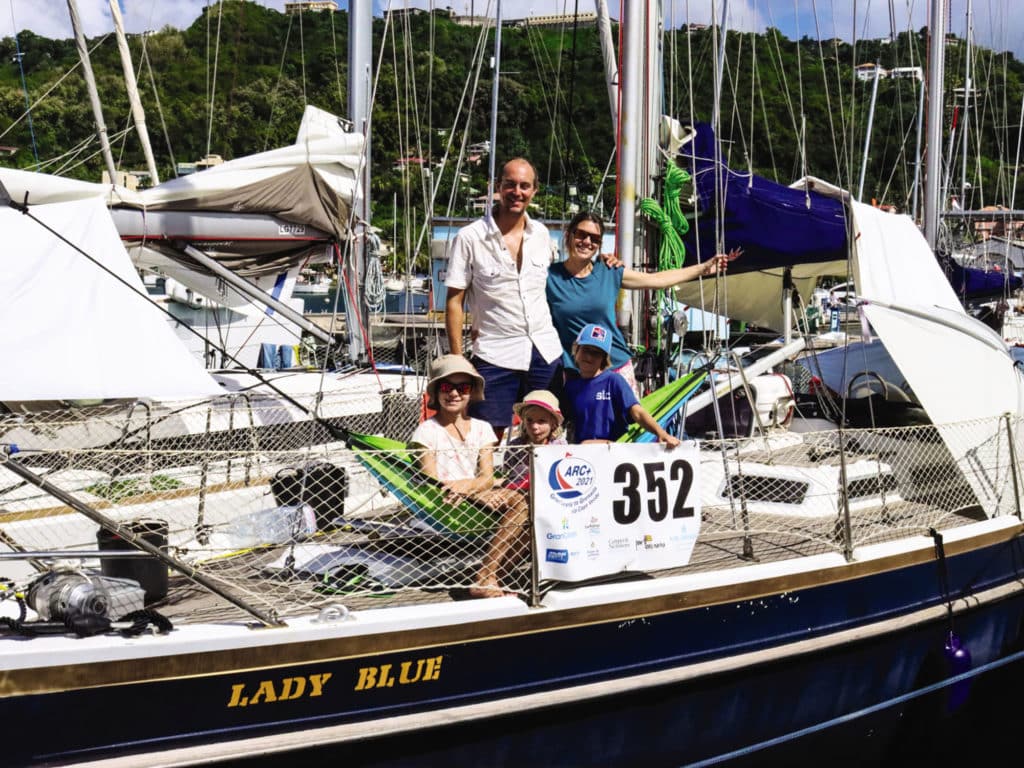
I continued on my way, only to come across another ukulele student. “My husband is the mastermind behind the song,” Lori Green told me as she pointed to a tall, slender man with a guitar case on his back. “It’s just a fun little thing I do for the rallies back home,” Barney Green said. The Greens have been living aboard their Bavaria 51, Favorita of Hamble, since June 2020. They had originally planned to do the ARC Plus in 2020, but like so many others, decided to postpone their cruise due to COVID. “Anyway, we’re here now,” Lori said with gratitude and relief. Barney told me that he began writing songs when he was the commodore at the Newbury Yacht Club, just outside London. The yacht club is “famous for being possibly the farthest yacht club from the sea,” he said.
I hung around to see who else was part of this merry little band of sailors, and ran into Paul Youngblood, whom I had met the previous day aboard his uncle’s Ted Hood 52, High Cotton. Paul, a 24-year-old from Minneapolis, is first mate on board and is on the last leg of an Atlantic circumnavigation with his uncle, John. Having crossed from Newport, Rhode Island, to the Azores in June 2021, they plan to take their time cruising the Caribbean, with Paul staying on board while John flies in and out from his work in financial services in New York. They did the crossing with two other crew on board, but it wasn’t without its challenges—namely, the misprovisioning of coffee and the necessary rationing that ensued. “Two and a half cups of caffeinated and one and a half of decaf per person, per day,” Paul had written on their blog shortly after departing Cape Verde. This misfortune was compounded by the fact that their autopilot stopped functioning during the first leg, forcing the crew to hand-steer for the duration of the Atlantic crossing, though they didn’t seem phased. “I’d say we’re all much better at the helm now than we were before,” John said with a laugh.
The High Cotton crew’s modest versatility was a common trait among the ARC Plus participants and planning committee. I got the chance to talk with Trish Jenkins, one of World Cruising Club’s famous Yellow Shirt team members. The Yellow Shirts are the boots on the ground who make sure events go off without a hitch and provide unwavering support to the participants. “We really didn’t know what events we’d be able to do this year, but we’ve worked closely with all the officials here [in Grenada], and it’s just fantastic to still be doing the ARC Plus,” Trish told me.
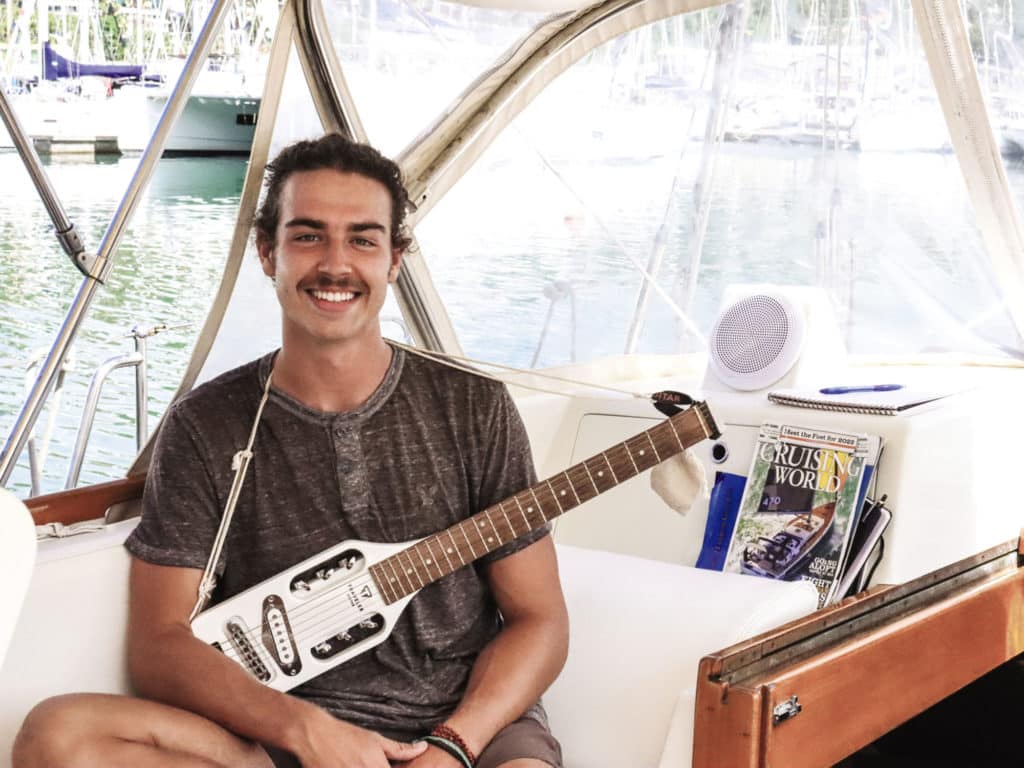
Among the most flexible and resilient participants are perhaps those on the family sailboats, many with young children aboard. Christian and Julie Pukelsheim on the Contest 42 Lady Blue had been planning for five years to cross the Atlantic with their three kids, now ages 11, 8 and 4. Unfortunately, when sudden and severe seasickness struck all but one of the children during their four-month voyage from Northern Spain, they were forced to rethink their plans. In the end, Julie and the kids flew across while Christian, who dreamed of having a family Christmas under a coconut tree in the Caribbean, found some last-minute crew to sail with him. As for their plans now? “We’ve been planning this for five years, and the plan ends today,” Christian said of his German family. “It’s a totally new feeling to not have a plan.”
I got a similar response from Australians Tillman and Verena Coxhead on board their Dick Zaal Skimmer 39, Big Bubble. “We made plans to come here, but we never thought we’d actually make it,” they told me. Their youngest of two children, Caruso, celebrated his 2nd birthday in the middle of the Atlantic and was one of the youngest in the fleet this year. When I asked them if they had any concerns about crossing the Atlantic with such young children, they assured me that they didn’t. “Any family boat who thinks about doing something like this, I would encourage them to; it’s a once-in-a-lifetime experience,” Verena said.
The same sentiment was echoed by most of the ARC Plus sailors. Maybe it was the fact that so many had postponed the adventure for a year due to COVID, or the uncertainty of last-minute changes and unexpected challenges, but everyone seemed incredibly grateful and relieved to finally be in Grenada. After the final evening of award presentations and celebrations, as Sally and I made our way back to the marina, the last verse of the ARC’s unofficial song played in my head:
Finally landing in Grenada, we smell, we’re tired, and it hurts.
Hoping rum punch will make things better, we search for yellow shirts.
I asked Sally how this year’s ARC Plus event compared with ones in the past. “You know,” she told me, “every ARC is different, but I think this one really had something special.”
I couldn’t agree more.
Lexi Fisher is a Grenadian/Canadian writer, freediver, and co-author of The Cruising Guides to the Windward and Leeward Islands.

